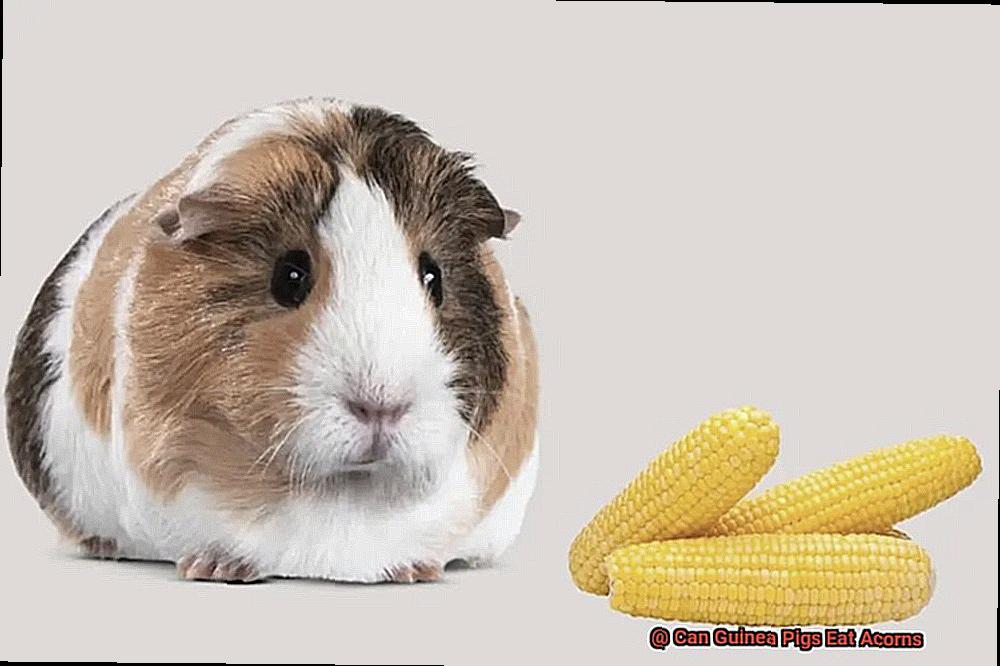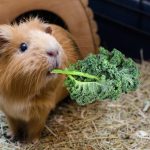Fall is here, and with it comes the classic snack of acorns.
As a guinea pig owner, you might be tempted to share this treat with your furry friend. But can guinea pigs eat acorns safely?
This question has puzzled many pet owners, and we’re here to give you the answer. Guinea pigs have a diverse diet that includes hay, pellets, and fresh vegetables.
However, acorns are not on the menu. These nuts come in various shapes and sizes and are enjoyed by deer, squirrels, and other animals.
Unfortunately, they are poisonous to guinea pigs. The tannins in acorns make digestion difficult for cavies.
Tannins can affect nutrient absorption in guinea pigs and lead to digestive disorders such as bloating, diarrhea, and discomfort. Eating too many acorns can cause severe health issues like liver damage or even death.
So, if you want to keep your furry friend healthy and happy, it’s best to avoid giving them acorns altogether. Instead, stick to safe fruits and vegetables like carrots, peppers, and apples.
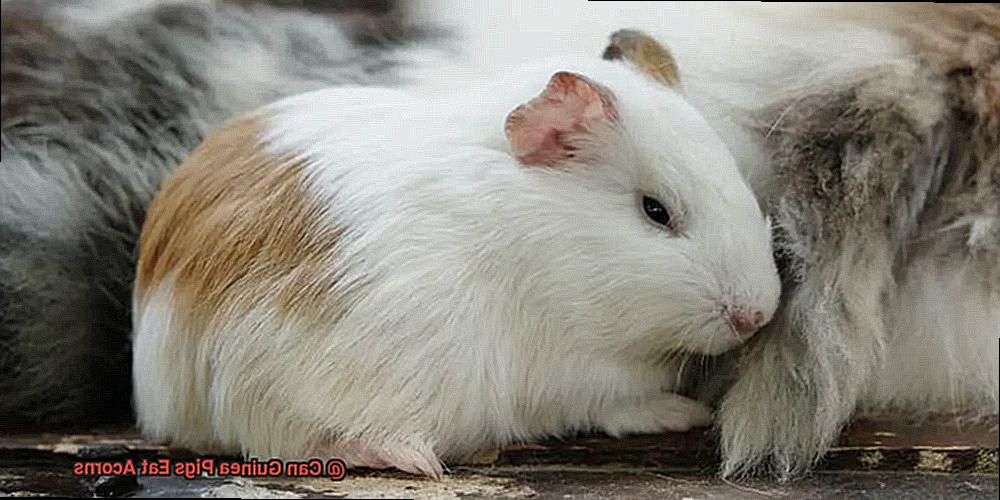
So, let’s get started now.
Nutritional Value of Acorns
Contents
Before you start feeding them to your furry friend, it’s crucial to understand their nutritional value.
Acorns are packed with calories and contain high amounts of carbohydrates, fats, and proteins. They’re also rich in fiber, an essential component of a herbivore’s diet.
However, their nutrient profile doesn’t meet the specific dietary requirements of guinea pigs. Guinea pigs need a diet that is rich in vitamin C, calcium, and phosphorus for optimal health.
While acorns do have some of these nutrients, they don’t have them in sufficient amounts to meet your guinea pig’s daily needs. Feeding acorns regularly can lead to malnutrition and other health issues.
In addition to their nutritional shortcomings, acorns also contain tannins which can be toxic to guinea pigs when consumed in large quantities. Tannins bind to proteins and other nutrients in the digestive tract and make it difficult for the body to absorb them.
This can lead to diarrhea, vomiting, and even death. Moreover, acorns are high in calories and fat content which can lead to obesity in guinea pigs.
To keep your pet healthy and prevent weight gain, it’s best to stick to a low-fat diet that includes fresh vegetables and fruits that are high in vitamin C. Timothy hay should also be provided as a source of fiber. In conclusion, while acorns may seem like a natural and healthy food source, they don’t provide adequate nutrition for guinea pigs.
It’s best to avoid feeding them acorns altogether and instead opt for a balanced diet that meets their specific dietary requirements.
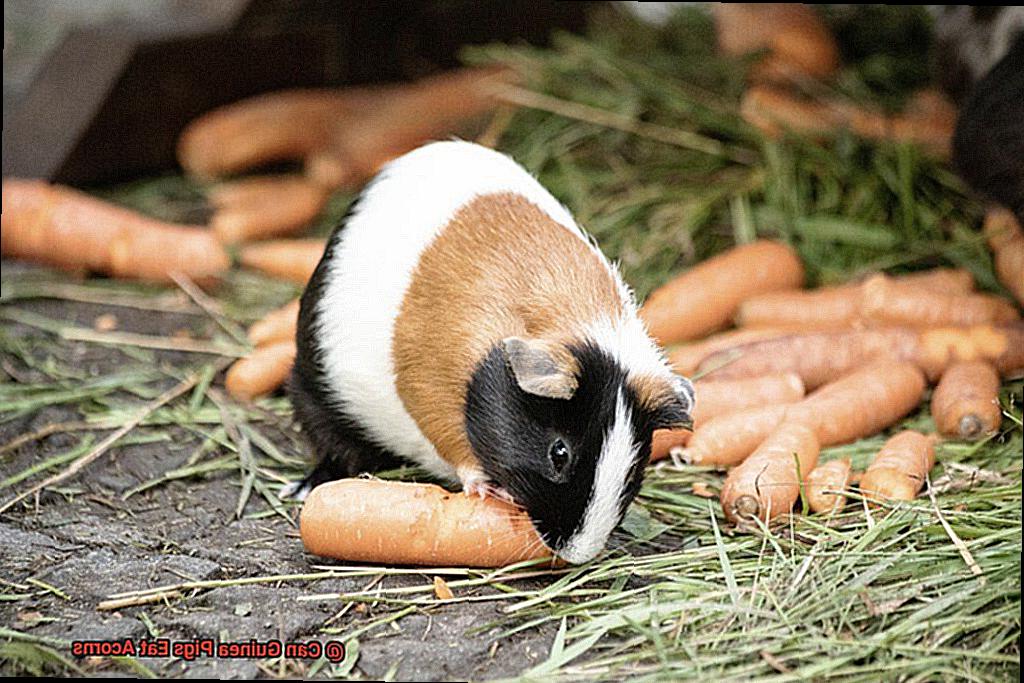
Can Guinea Pigs Eat Acorns?
As much as we may love to feed them some nuts, it’s best to steer clear of acorns.
Acorns are high in tannins, which can cause digestive problems in guinea pigs.
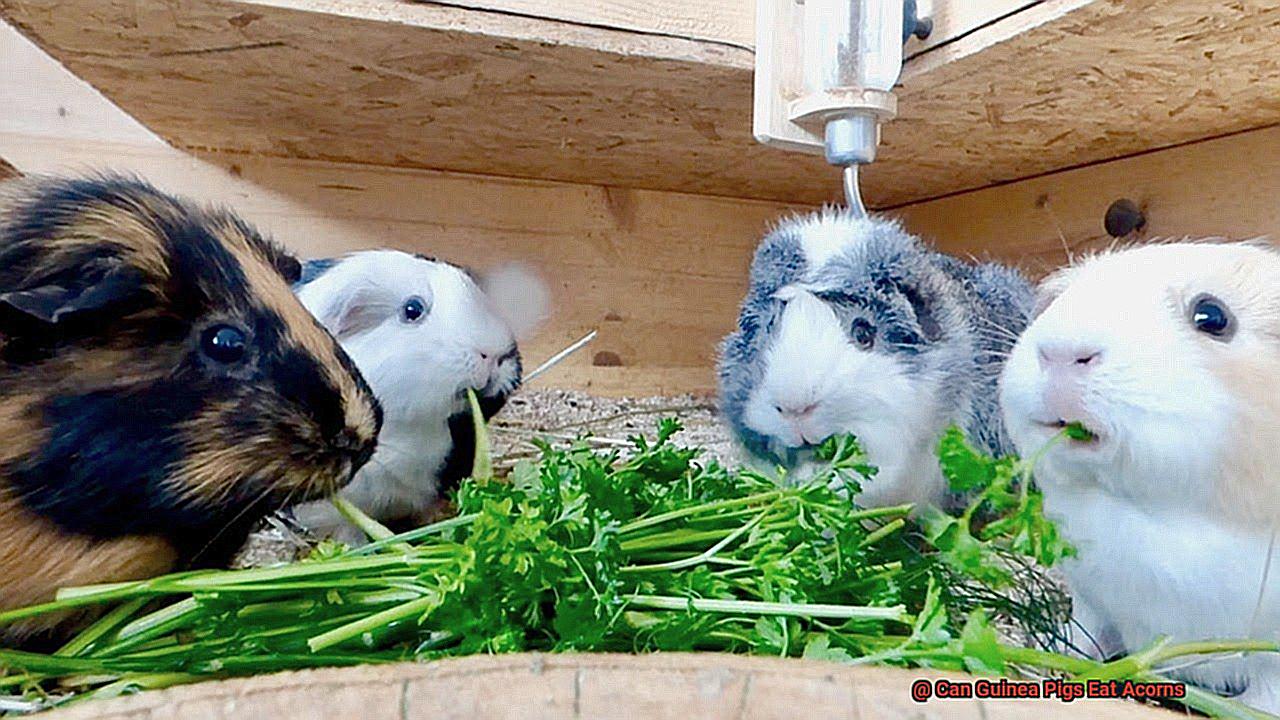
Tannins are like the uninvited guests at a party; they bind to proteins and make them difficult to digest, causing diarrhea, constipation, and bloating. But that’s not all; acorns also have a high-fat content – a big no-no for our furry friends.
To maintain optimal health and happiness, guinea pigs require a balanced diet that is low in fat and high in fiber. Feeding them acorns can cause them to become overweight and suffer from other health problems.
Instead of acorns, opt for a diet that consists of hay, fresh vegetables, and pellets that are specifically formulated for your guinea pig’s nutritional needs. Think of it as a gourmet feast for your little buddy – packed with all the vitamins they need to thrive.
While acorns may seem like a natural choice for guinea pig snacks, it’s best to avoid them due to their high tannin and fat content.
Health Risks of Feeding Guinea Pigs Acorns
While it’s important to provide them with a balanced diet, not all foods are safe for them.
One such food is acorns, which can pose multiple health risks to your furry friend. Acorns are high in fat and carbohydrates, which can cause weight gain and related health issues such as heart disease and diabetes.
Additionally, the high tannin levels in acorns can lead to digestive problems like diarrhea and bloating. These tannins can also interfere with the absorption of essential nutrients like calcium and protein, resulting in nutrient deficiencies and health problems.
But that’s not all – acorns may contain toxins that are harmful to guinea pigs. Oak tree acorns contain gallotannin, a chemical that can interfere with liver function and cause liver damage.
This chemical can also result in the formation of gallstones in the bladder and liver. Additionally, mold or fungi found on acorns can cause respiratory problems in guinea pigs.
So, feeding your guinea pig acorns can put their health at risk due to their high-fat content, tannins, potential toxins, and risk of mold or fungi. It’s best to avoid feeding them acorns altogether and stick to a diet of hay, fresh vegetables, and fruits recommended by your veterinarian.
While it may be tempting to offer your furry friend a tasty treat like acorns, their well-being should always come first.
Alternatives to Feeding Guinea Pigs Acorns
These nuts can be detrimental to their health due to their high levels of tannins and other substances that can cause digestive issues, nutritional deficiencies, and even liver damage. But fret not, there are plenty of other options out there that guarantee a balanced diet and meet their nutritional requirements.
A great alternative to acorns is fresh fruits and vegetables. Leafy greens like kale and spinach are delicious choices, as well as fruits like apples and strawberries.
Not only are these options safe for guinea pigs, but they also contain essential vitamins and minerals that can help keep them healthy and happy. Hay is another crucial part of a guinea pig’s diet.
It helps keep their teeth healthy and prevents digestive problems. Timothy hay is an excellent choice as it is high in fiber and low in calcium.
Pelleted food is also a good option to consider. Look for pellets specifically formulated for guinea pigs that contain a balanced mix of vitamins, minerals, and other essential nutrients.
In addition to these options, you can also supplement your guinea pig’s diet with small amounts of treats like carrots or cucumbers. However, it’s essential to avoid feeding them sugary or fatty foods as these can be harmful to their health.
Remember, a balanced diet that includes fresh fruits and vegetables, hay, pelleted food, and the occasional treat will help ensure that your guinea pig stays happy and healthy for years to come.
How to Safely Feed Your Guinea Pig Acorns
Acorns contain high levels of tannins, which can cause digestive issues in guinea pigs. These tannins can lead to stomach upset, diarrhea, and even kidney damage if consumed in large quantities. Therefore, it’s crucial to avoid feeding your guinea pig acorns altogether.
If you still want to provide your guinea pig with a nutty treat, there are other options that are safe and healthy for them. Some safe nut options for guinea pigs include almonds, cashews, and hazelnuts. However, it’s essential to remember that these nuts should only be fed in moderation as they are high in fat and calories.
When feeding nuts to your guinea pig, it’s best to offer them as a rare treat rather than a regular part of their diet. It’s also important to make sure that the nuts are fresh and have not gone rancid as this can cause digestive problems.
Additionally, nuts should be given in small portions and broken into smaller pieces to prevent choking hazards.
If you do decide to feed your guinea pig acorns, it’s important to do so with caution. Start by introducing small amounts of acorns into their diet and monitor their reactions closely. If you notice any signs of digestive distress, such as diarrhea or vomiting, stop feeding them acorns immediately.
It’s also important to note that not all types of acorns are safe for guinea pigs to eat. Some varieties may contain higher levels of tannins than others, which can be toxic to your pet. If you’re unsure about the safety of a particular type of acorn, it’s best to avoid feeding it to your guinea pig altogether.
So, while it may be tempting to feed your guinea pig acorns found on fall walks, it’s best to avoid this snack altogether. Instead, opt for safe nut options such as almonds, cashews, and hazelnuts as an occasional treat.
Remember to always give nuts in moderation and ensure they are fresh and broken into small pieces to prevent any health issues for your furry friend.
Signs of Illness in Guinea Pigs Related to Eating Acorns
While they may enjoy munching on various fruits and veggies, it’s essential to be aware of what foods can be harmful to their health.
Acorns may seem like a harmless snack, but they contain tannins that can bind to proteins and other nutrients in your guinea pig’s digestive tract, making them difficult to absorb.
Consuming too many acorns or any part of an oak tree can lead to various health problems for your pet. So, what are the signs of illness in guinea pigs related to eating acorns?
Look out for diarrhea, constipation, bloating, abdominal pain, loss of appetite or weight, lethargy, and dehydration. These symptoms can be severe and even result in liver or kidney damage if left untreated.
To ensure your guinea pig stays healthy, monitor their behavior and eating habits regularly. If you notice any of the above signs of illness, take your pet to the veterinarian immediately.
Remember that delaying medical attention can have significant health consequences. To prevent your guinea pig from consuming acorns or any part of an oak tree, make sure they do not have access to areas where these plants grow.
If you have oak trees on your property or nearby, ensure that your guinea pig’s enclosure is secure and inaccessible to them. In conclusion, while it may be tempting to offer your guinea pig a fall treat like acorns, it’s best to avoid giving them this food entirely.
Acorns can cause serious health problems in guinea pigs and should be kept away from them at all times.
Conclusion
In conclusion, it’s best to steer clear of feeding your guinea pig acorns.
Despite their popularity as a snack, acorns contain high levels of tannins that can cause digestive problems and put your furry friend at risk for serious health issues like liver disease or even death. Instead, focus on providing a balanced diet that includes hay, pellets, and fresh vegetables.
Your guinea pig will love snacking on nutritious foods like kale, spinach, apples, and strawberries – all packed with essential vitamins and minerals to keep them healthy. While it’s okay to offer small amounts of snacks like carrots or cucumbers, avoid sugary or fatty treats that could harm your pet’s health.
If you’re looking for a nutty treat for your guinea pig, try almonds, cashews, or hazelnuts in moderation since they are high in fat and calories. Be mindful of the warning signs of illness related to eating acorns such as diarrhea, constipation, abdominal pain, hunger pangs, loss of appetite or dehydration.
Overall, taking care of your guinea pig’s dietary needs is crucial for their well-being and happiness.

